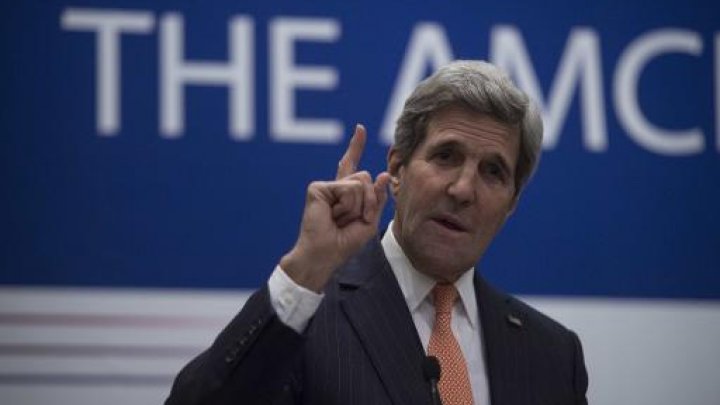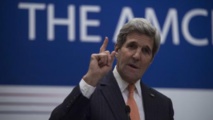Riyadh has said it is considering temporary halts in air raids to allow aid deliveries into Yemen, where a Saudi-led coalition took action on March 26 to halt an advance by Iran-backed rebels.
Twenty-two humanitarian organisations warned their emergency aid operations in Yemen could cease because of fuel shortages, and urged an immediate opening of roads as well as an end to the coalition's air and sea blockades.
There has also been growing concern for civilians in the war.
On Wednesday, 32 people were reported to have died while trying to flee the southern city of Aden by sea.
A health official accused the Huthi Shiite rebels of killing the civilians and wounding another 67 in the shelling of a fishing harbour and a barge.
Before he travelled to Saudi Arabia, Kerry told reporters in Djibouti he would raise the issue of a temporary halt to air strikes with officials in Riyadh.
"We will be discussing the nature of the pause and how it might be implemented," said Kerry, who Wednesday night held talks with Saudi Crown Prince Mohammed bin Nayef and was to meet King Salman on Thursday.
"We are deeply concerned about the humanitarian situation that is unfolding in Yemen... For the time being the immediate crisis is the humanitarian one," Kerry said.
- Severely crippled -
As well as international concern over the growing civilian death toll from the air campaign and fighting, deliveries of fuel, food and medicine have been severely crippled in the impoverished Arabian Peninsula nation.
Yemen's Foreign Minister Riyadh Yassin told reporters in the Saudi capital that he hoped on Thursday to also hold talks with Kerry, "especially about the humanitarian aid to Yemen. We hope tomorrow to discuss how we can go forward".
The minister appeared to choke up and later wiped his eyes after talking about the latest casualties in Aden.
Yemen's mission to the United Nations, meanwhile, on Wednesday issued a letter to the UN Security Council calling for a ground intervention to push back the rebel offensive and urged rights groups to document "barbaric violations" allegedly carried out by the anti-government fighters.
The United Nations says at least 1,200 people have been killed in Yemen since March 19, roughly half of them civilians.
The air strikes began as anti-government fighters approached Aden, forcing President Abedrabbo Mansour Hadi to flee to Riyadh.
The new UN envoy for Yemen, Ismail Ould Cheikh Ahmed, is to follow Kerry to Riyadh on Thursday in a bid to relaunch peace talks.
There has been heavy combat in Aden, where rebel gunfire killed a pro-government general on Wednesday.
A military official said General Ali Nasser Hadi -- no relation to Yemen's exiled president -- was shot dead. He headed loyalist forces in three southern provinces.
Thousands have fled Yemen, many to Djibouti in the Horn of Africa across the Bab al-Mandeb, a key shipping channel.
- Shells from Yemen -
The war hit home in Saudi Arabia for a second day on Wednesday.
The civil defence department said four civilians and a prison security officer were killed by shells fired from Yemen at the border city of Najran.
The bombing came a day after the interior ministry said three people were killed in Najran in cross-border mortar and rocket attacks by the Huthis.
It was their first attack on a Saudi city during the conflict.
Fighting along the frontier has killed 12 soldiers and border guards in recent weeks.
Official media said separately that a missile killed a husband and wife in the Jazan border region, without specifying its origin.
On April 21, Riyadh declared nearly a month of air strikes a success and said "threats to Saudi Arabia's security and that of neighbouring countries" had been removed by destroying heavy weaponry and ballistic missiles seized by the rebels.
The coalition said it was entering a new phase, but air strikes continued and fighting between pro- and anti-government loyalists has been uninterrupted on the ground.
On Tuesday, leaders of the six Sunni-dominated Gulf Cooperation Council states at a summit in Riyadh welcomed a decision by Hadi to host a meeting of Yemeni political forces in the Saudi capital on May 17 to try to resolve the crisis.
But the Huthi rebels reject talks in the city and have sought negotiations sponsored by the United Nations.
--------------------------------------------------------------------------------------------------------------------------------
Twenty-two humanitarian organisations warned their emergency aid operations in Yemen could cease because of fuel shortages, and urged an immediate opening of roads as well as an end to the coalition's air and sea blockades.
There has also been growing concern for civilians in the war.
On Wednesday, 32 people were reported to have died while trying to flee the southern city of Aden by sea.
A health official accused the Huthi Shiite rebels of killing the civilians and wounding another 67 in the shelling of a fishing harbour and a barge.
Before he travelled to Saudi Arabia, Kerry told reporters in Djibouti he would raise the issue of a temporary halt to air strikes with officials in Riyadh.
"We will be discussing the nature of the pause and how it might be implemented," said Kerry, who Wednesday night held talks with Saudi Crown Prince Mohammed bin Nayef and was to meet King Salman on Thursday.
"We are deeply concerned about the humanitarian situation that is unfolding in Yemen... For the time being the immediate crisis is the humanitarian one," Kerry said.
- Severely crippled -
As well as international concern over the growing civilian death toll from the air campaign and fighting, deliveries of fuel, food and medicine have been severely crippled in the impoverished Arabian Peninsula nation.
Yemen's Foreign Minister Riyadh Yassin told reporters in the Saudi capital that he hoped on Thursday to also hold talks with Kerry, "especially about the humanitarian aid to Yemen. We hope tomorrow to discuss how we can go forward".
The minister appeared to choke up and later wiped his eyes after talking about the latest casualties in Aden.
Yemen's mission to the United Nations, meanwhile, on Wednesday issued a letter to the UN Security Council calling for a ground intervention to push back the rebel offensive and urged rights groups to document "barbaric violations" allegedly carried out by the anti-government fighters.
The United Nations says at least 1,200 people have been killed in Yemen since March 19, roughly half of them civilians.
The air strikes began as anti-government fighters approached Aden, forcing President Abedrabbo Mansour Hadi to flee to Riyadh.
The new UN envoy for Yemen, Ismail Ould Cheikh Ahmed, is to follow Kerry to Riyadh on Thursday in a bid to relaunch peace talks.
There has been heavy combat in Aden, where rebel gunfire killed a pro-government general on Wednesday.
A military official said General Ali Nasser Hadi -- no relation to Yemen's exiled president -- was shot dead. He headed loyalist forces in three southern provinces.
Thousands have fled Yemen, many to Djibouti in the Horn of Africa across the Bab al-Mandeb, a key shipping channel.
- Shells from Yemen -
The war hit home in Saudi Arabia for a second day on Wednesday.
The civil defence department said four civilians and a prison security officer were killed by shells fired from Yemen at the border city of Najran.
The bombing came a day after the interior ministry said three people were killed in Najran in cross-border mortar and rocket attacks by the Huthis.
It was their first attack on a Saudi city during the conflict.
Fighting along the frontier has killed 12 soldiers and border guards in recent weeks.
Official media said separately that a missile killed a husband and wife in the Jazan border region, without specifying its origin.
On April 21, Riyadh declared nearly a month of air strikes a success and said "threats to Saudi Arabia's security and that of neighbouring countries" had been removed by destroying heavy weaponry and ballistic missiles seized by the rebels.
The coalition said it was entering a new phase, but air strikes continued and fighting between pro- and anti-government loyalists has been uninterrupted on the ground.
On Tuesday, leaders of the six Sunni-dominated Gulf Cooperation Council states at a summit in Riyadh welcomed a decision by Hadi to host a meeting of Yemeni political forces in the Saudi capital on May 17 to try to resolve the crisis.
But the Huthi rebels reject talks in the city and have sought negotiations sponsored by the United Nations.
--------------------------------------------------------------------------------------------------------------------------------









 Home
Home Politics
Politics











